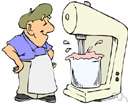commixture
Also found in: Thesaurus.
com·mix·ture
(kə-mĭks′chər, kŏ-)n.
1. The act or process of mixing.
2. The result of mixing; a mixture.
American Heritage® Dictionary of the English Language, Fifth Edition. Copyright © 2016 by Houghton Mifflin Harcourt Publishing Company. Published by Houghton Mifflin Harcourt Publishing Company. All rights reserved.
Commixture
a mixture or compound.Examples: commixture of good and evil acts, 1607; of intellectual delights, 1643; of virtues and vices, 1601.
Dictionary of Collective Nouns and Group Terms. Copyright 2008 The Gale Group, Inc. All rights reserved.
ThesaurusAntonymsRelated WordsSynonymsLegend:
Switch to new thesaurus
| Noun | 1. |  commixture - the act of mixing together; "paste made by a mix of flour and water"; "the mixing of sound channels in the recording studio" commixture - the act of mixing together; "paste made by a mix of flour and water"; "the mixing of sound channels in the recording studio" |
Based on WordNet 3.0, Farlex clipart collection. © 2003-2012 Princeton University, Farlex Inc.
commixture
nounThe American Heritage® Roget's Thesaurus. Copyright © 2013, 2014 by Houghton Mifflin Harcourt Publishing Company. Published by Houghton Mifflin Harcourt Publishing Company. All rights reserved.